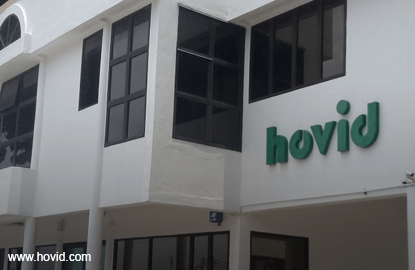
This article first appeared in The Edge Financial Daily, on June 27, 2016.
KUALA LUMPUR: Ipoh-based pharmaceutical company Hovid Bhd is in “expansion mode” now. It is investing up to RM60 million for a new research and development (R&D) centre and to expand its manufacturing facility, after which it expects to reap the fruits of its investments by the financial year ending June 30, 2018 (FY18).
It expects to spend RM15 million on the R&D plant, to be located in Bayan Lepas, Penang, and RM45 million on a pharma plant, which will be situated in Chemor, Perak, its home base, next to its existing pharma plant there.
“We need to wait for approval from the National Pharmaceutical Control Bureau (NPCB) for licences for both our R&D centre and the [new] Chemor plant, which will take some time. Therefore, we expect to see revenue contribution from these new developments only in FY18,” Hovid chairman and managing director David Ho Sue San told The Edge Financial Daily in a recent interview.
The R&D plant in Penang will conduct bioequivalence (BE) studies — the comparison of medicinal products containing the same active substance — which is expected to strengthen the group’s product portfolio.
“We just finished building the centre in Penang. We aim to get the licence from the NPCB by next year. The approval takes around a year as the requirements are similar to that in applying for a hospital licence; we will need to employ doctors, nurses, and emergency medical personnel, just like a hospital.
“Once we get the approvals, we can accelerate our product development,” said Ho.
The group previously collaborated with hospitals for its BE studies, for which it used to take up some 40 beds. The lack of available hospital beds posed a problem for it at times.
“Now, with our facility, we have our own beds — 48 in total. We have been approached by other companies to conduct BE studies for them too, which we now have the capacity to do,” said Ho.
Meanwhile, the group is also waiting for NPCB’s nod for the commencement of its new pharma plant, which is actually the phase 2 of its existing facility in Chemor. It hopes to secure the approval for the project in six months.
“Although the new plant will make similar products — tablets and capsules for oral consumption — the difference will lie in the processes. It will be more automated, with higher technology applied,” said Ho.
The expansion, split into phases 1 and 2, was primarily because the existing facility had reached its peak capacity, while orders piled up. Phase 1 began early this year. It expects to start work on Phase 2 by year end. When the plant is fully commissioned, Ho believes it will be able to handle the expected growth in orders for its tablets and capsules for the next three to five years.
The new plant has also been designed to meet the pharmaceutical production standards of Europe, the US Food and Drug Administration (US FDA), and the Australian Therapeutic Goods Administration.
Hovid, which derives 55% of its revenue from the export markets, with Asia being its biggest outbound market, is pushing for more exports.
But its plan to globally market its Tocovid Suprabio product, which is touted to be able to reduce the risk of a mini stroke, is yet to be realised, as the US FDA trials for the product are still ongoing and will need another two years before the results can be published, said Hovid chief financial officer Andrew Goh.
For its nine months ended March 31, 2016, Hovid’s net profit fell 28.8% year-on-year to RM 11.68 million.